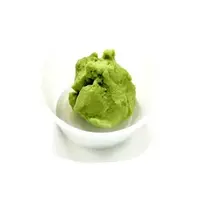Wasabi

Today we will talk about one of the Japanese products - wasabi, which is often also called Japanese horseradish. It's a spicy-sweet pasta that features a pale green tinge and is an essential part of sushi. In its sharpness, wasabi is similar to mustard and, when eaten, stimulates the nasal passages more than the receptors of the tongue. But as for the health benefits of this product, you still have to find out about it. Although Japanese lovers of the healing properties of wasabi were known as early as the tenth century.
Unfortunately, in modern Japanese eateries and sushi bars, the main part of wasabi pasta is, one might say, only an imitation of a real product, and is made of horseradish, mustard, spices and food dyes. True wasabi is too expensive, although no less useful. The reason for this high cost is the difficulties associated with growing. The fact is that in order to form a suitable root crop, from which spicy paste is made, it takes three years. Another prerequisite is high ambient humidity and constant cold.
Wasabi has found its true application in cooking, where this paste is usually added to various broths and soups to give them a rich taste. In supermarkets, this product can most often be found in the form of pasta or, much less often, powder. The calorie content of wasabi is 109 kcal per 100 grams.
Wasabi benefits
The benefits of wasabi as a rich source of isothiocyanates, which belong to natural antioxidants, are known. Their properties are manifested in the fact that they are able to inhibit the formation of metastases, while not damaging healthy cells, but "working" exclusively with cancer.
Recently, a number of studies have been underway, with high hopes that wasabi will help find medicines for asthma, arthritis, hay fever and many other allergic reactions.
In addition, wasabi not only prevents inflammation in the body, but also has the strongest antibacterial properties. Through one recent discovery in the medical field, eating this green paste has been found to be able to stop the growth of bacteria that are responsible for food poisoning. It is not for nothing that this spicy addition to raw fish dishes is served in Japan.
Wasabi's dental benefits are also evident, as it kills bacteria that cause tooth decay. In some countries, trial production of toothpaste, as well as antibacterial soap with wasabi extract, has already begun.
Wasabi harm
The harm of wasabi (when consumed in large quantities) can fully affect people who are sick with cholecystitis, hepatitis, hyperacidal gastritis and pancreatitis in the stage of exacerbation.
wasabi 109 kKal
Energy value of wasabi (Ratio of proteins, fats, carbohydrates - ju):
Proteins: 4.8 g (~ 19 kCal)
Fats: 0.63 g (~ 6 kCal)
Carbohydrates: 23.54 g (~ 94 kCal)
Energy ratio (b | y): 18% | 5% | 86%
 Español
Español Français
Français Português
Português Русский
Русский 简体中文
简体中文 繁體中文
繁體中文 日本語
日本語 한국어
한국어 العربية
العربية Türkçe
Türkçe Қазақ
Қазақ Deutsch
Deutsch Italiano
Italiano Українська
Українська
